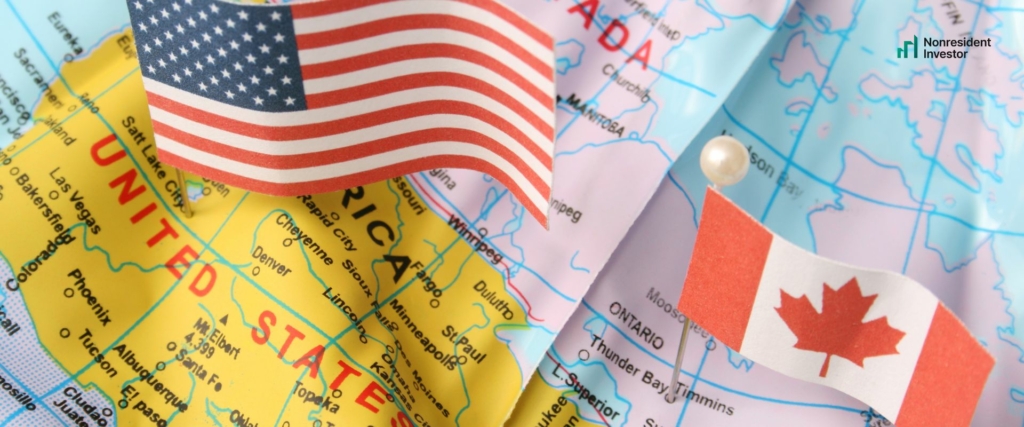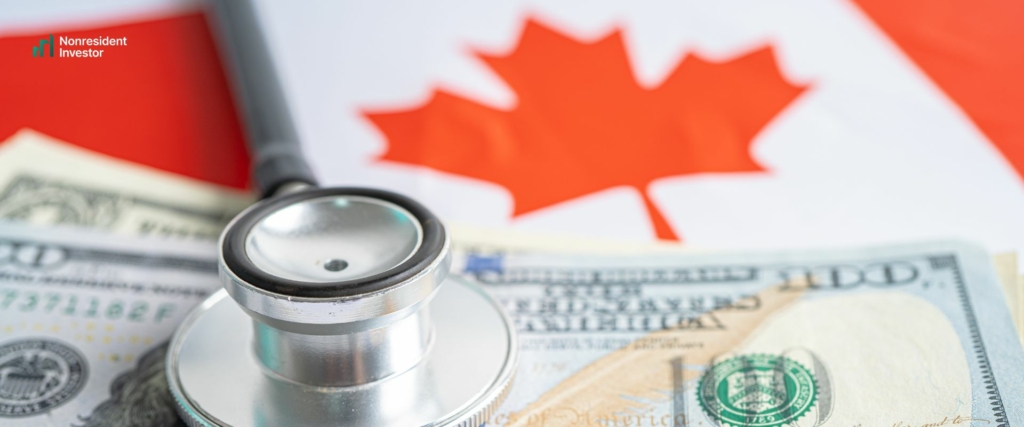The whole process of moving to USA from Canada might seem daunting, and that’s because it truly is. There are a lot of things you have to familiarize yourself with and a lot of preparation you need to undertake. Moving to another part of the world is a life-changing decision and should not be taken lightly.
The move from Canada to the US involves careful planning and understanding of various laws and regulations. It also includes getting familiar with various types of US visas available to Canadian citizens. Besides that, you will also need to find a place to live, which means familiarizing with the US real estate market.
Luckily for you, we aim to explore all of that in this article. But before we begin doing just that, let’s first answer the following question.
Is It Worth Moving to USA From Canada?
The yearly GDP of the US is around $16 trillion, which makes it the world’s largest economy. In comparison, Canada’s GDP is about $1.8 trillion, or more than 9 times less than that of the US. The average salary in the US is about $56,000, while in Canada, it hovers around $43,000.
Alongside that, there is some degree of economic instability that Canada is experiencing, with increasing inflation, rising interest rates, and slowing down of the economy, as per the words of Chrystia Freeland (Canada’s finance minister).
And, lastly, there’s the question of housing prices that have skyrocketed, making it virtually impossible for an average Canadian to afford a home in their city. Just since the beginning of January of 2023, the cost of an average house went up from C$600,000 to above C$700,000, prompting the Canadian National Bank to hike interest rates. This trend is nothing new for the real estate market in Canada, as the average home price has been rapidly growing and has almost doubled in the past decade (from about C$400,000 to now above $700,000).
It’s the economic potential and greater opportunities, combined with various personal factors, that drive Canadians to move to the US. And that’s exactly what ultimately makes it worth moving to USA from Canada.

What Are the Most Popular Places for Canadians Moving to US?
According to the most recent available census data that covers the period from 2015-2019, Canadians that have immigrated to the US mostly went to the following states:
- California – 16% of Canadian immigrants;
- Florida – 14% of Canadian immigrants;
- New York – 7% of Canadian immigrants;
- Texas – 6% of Canadian immigrants;
The counties that have the highest population of Canadian immigrants in the US are:
- Los Angeles County (California);
- Orange County (California);
- Maricopa County (Arizona);
- King County (Washington);
- Broward County (Florida);
When combined, these five counties are home to around 13% of all Canadian immigrants currently living in the US.
What Are the Most Popular Places in US for Canadian Tourists?
Apart from moving to live there, a lot of Canadians choose to visit the US as tourists. And, as Canada is not exactly known for its good climate, this comes as no surprise. The same goes for Australians moving to the US.
The most popular cities in the US for Canadian tourists include:
- Orlando;
- Las Vegas;
- Miami;
- Los Angeles;
- San Francisco;
- New York.
Moving to USA From Canada: 3 Initial Steps
Step 1 – Have a Valid Passport
As a Canadian citizen, if you want to move to the US you must have a valid passport. If you don’t own one, make sure to start the whole process of getting a passport as early as possible. It can take up to 20 business days (depending on the exact region, time of year, national holidays, etc.)
You should note that without a visa (or with just a passport) Canadians can usually stay in the US for up to 6 months, but only as visitors or tourists. This means that if you want to go to the US with just your passport, you won’t be allowed to work in the US as a Canadian. Which means you can’t receive payment or many of the other things that legal US residents are entitled to.

Step 2 – Check Different US Visa Categories
Depending on the exact circumstances behind your move to US from Canada, you’ll probably have to apply for a visa. Luckily, there are plenty of US visa options for Canadian citizens.
Work Visas for Canadian Citizens
- H-1B Visa – Allows Canadian citizens to, for a certain period (usually up to 3 years), legally work in the US.
- TN Visa – Included as a special provision of the NAFTA (North American Free Trade Agreement). This visa allows Canadians whose current profession qualifies under the regulations of NAFTA to move to the US for work.
- E-1/E-2 Visa – These visas give Canadian citizens permission to participate in trade activities or make investments in the US markets (including real estate, stock exchange, and more).
- L-1 Visa – Reserved for intracompany transfer of executives or manager-level professionals to a branch that operates in the US.
- O-1 Visa – Allows Canadian citizens who exhibit extraordinary talent in specific fields (e.g., science, art, sports, etc.) to move to the US temporarily (starts with a 3-year period that can be extended in perpetuity, in one-year increments).
Other Types of US Visas for Canadians
- K-1 Visa – Popularly called the “fianc(é)e visa”, allows Canadian citizens to move to the US and marry an American resident.
- IR-1/2/3/4/5 – These types of visas give Canadians a permit to move to the US in order to join their close family member/s.
- Family preference visas – These categories of visas allow Canadian citizens to move to the US if they are related to a legal US resident (e.g., married children, siblings, cousins).
Step 3 – Prepare Documentation
Moving to USA from Canada will require a lot of documentation. So, be ready for that and make sure that you have everything prepared before you start moving to USA from Canada.
Here are just some of the documents that you might need to make the travel to US go as smoothly as possible:
- Valid passport – Ensure your Canadian passport is not expired and is going to be valid for at least six months after you choose to enter the US soil.
- Birth certificate – This is used to prove your identity or the identity of your family members who are moving together with you. If you don’t have a birth certificate on hand, you can easily start the process of getting one from the Canadian government. The entire thing usually takes between 5-15 business days and can cost you up to C$75. So, be ready for that.
- Medical examination – Anyone applying for a US visa has to go through a physical examination to receive the required documentation. This type of medical exam is performed by a licensed doctor or a specialized physician. Depending on your age and the age of people traveling with you, the visa medical check-up may require different things. For example, chest X-rays are not mandatory for children under the age of 15, but might be required for anyone above that age group.
- Photos – At least two recent and identical passport-like photos (not older than 6 months) are required for each visa applicant. Meaning, you and each of your family members who are applying to get a US visa should prepare two photographs. Each photo should be printed on photo-quality paper and should be 2 x 2 inches (51 x 51 mm) in size.
- Evidence of financial stability – Depending on the type of visa you’re applying for, you might need to prove that you’re financially stable. You can do that with bank statements, tax returns, and other types of financial information. It’s best to prepare them in advance, as it may take time to get all the documents in order and ready for the US embassy.
- Proof of marriage – If you are trying to gain a US visa through your spouse, who is a legal US resident, you are going to need proof that you are actually married. Most likely, you’ll just need a marriage certificate or other types of documentation that proves you are legally married.
- Police clearance certificate – Anyone above the age of 16 who is applying for a US visa needs to get a police certificate. You need to get this document from each country you’ve lived in for over one year. Meaning, that if you’re currently living in Canada but have spent a couple of years, let’s say in France, you need to get a police clearance certificate from both Canadian and French authorities.
- Other types of documentation – Depending on the exact type of visa you’re applying for, there’s a chance you might need some extra documentation. For example, if you are going with a TN Visa, you will probably need some documents that prove your professional credentials are indeed accurate and true.

Immigrating to USA From Canada: Moving Forward
You’ve done all the initial steps, prepared all the documentation, and are going forward with your decision to move to the US from Canada, but the journey is not done yet. There are some additional things that you should do in order to ensure your transition to the US is as painless as possible.
Create a US Bank Account
If you want to make your move to the US permanent, you’ll have to create a US-based bank account. Doing so will allow you to:
- Have full access to the US financial system;
- Use of various payment services providers only available in the US or that come with additional benefits to legal US residents. (e.g. PayPal, Stripe, Wise, etc.)
- Invest in rental properties and the US real estate market.
- Make financial transactions;
- Pay taxes;
- Receive payments from your employer;
Get a US Social Security Number
The Social Security number (SSN) is used as a means to identify US citizens and permanent and temporary residents. It can open many doors and create many opportunities for non-citizens and is primarily used for:
- Tracking social security benefits;
- Tracking tax obligations of each SSN holder;
- Employers use it to report wages and taxes;
- Banks use it to track credit scores;
- Many financial institutions use SSNs as a means to track financial transactions;
While a US Social Security Number is a must-have for any Canadian moving to the States, we should also mention the Individual Taxpayer Identification Number (ITIN). The IRS issues ITINs
to certain groups of nonresident aliens who are not eligible to get a SSN. The purpose of this document is to help individuals comply with US tax laws, and to give them the means to process and account for tax returns and payments (in the case they are not eligible to receive a Social Security number).

Check Out Healthcare Providers
The US healthcare system is vastly different from the one in Canada. The differences are so great that many Canadians moving to US have trouble figuring out what exactly to do.
The most common differences in healthcare systems of these two countries include:
- Canada has a universally accessible healthcare system. Every Canadian citizen and permanent resident has access to medical services without having to pay out-of-pocket. The healthcare system in the US is, to a large extent, privatized. This means that medical services are usually provided by private hospitals or doctors and that most US residents need to pay for health insurance in order to cover their medical bills.
- All Canadian citizens and residents have access to the national health insurance programs. Private insurance still exists but is mostly used for medical services that are not available in the public system (various prescription drugs, dental, etc.). Health insurance in the US is often provided by employers or is purchased individually. There are some public health insurance options (like Medicare and Medicaid), but they are extremely limited when compared to insurance provided by private healthcare companies.
- The cost of medical bills in Canada is paid through taxation and is much lower when compared to medical bills in the US. For example, an average bloodwork will cost around $500 in the US, while in Canada, the cost will be closer to $100.
So, if you’re moving from Canada to US, make sure you check out various healthcare providers. Talk to your employer (if you have one), and see what sort of health insurance they have on offer. And all in all, expect to pay a bit more for it.
Learn About US Tax Laws
US tax laws are different from the ones in Canada and can greatly vary from state to state. For example, the average property tax in Florida is around 0.8%, while in New Jersey property taxes can go up to 2.2%. So, before you make US soil your permanent residence, make sure you learn more about tax laws. To be more specific, learn about tax laws in the state you’re going to move into.
Another important thing to keep in mind is – how is active income taxed in the US.
Most commonly and on the federal level, active income will be taxed under income tax rates. Now, these rates can greatly vary based on your income and the way you file for taxes. In the US, the tax system is progressive, which means that the higher your income is, the more taxes you’ll have to pay. In general, there are 5 tax brackets, and based on your income, you’ll be eligible for one of them. And, depending on which tax bracket you eventually end up belonging to, you’ll have to pay 10%, 12%, 22%, 24%, 32%, 35%, or 37% of your income to the government.
There are also state taxes that you have to take into consideration. They will vary greatly from state to state, so be sure to check those out before your move.

Find a Place to Stay Before Moving to USA From Canada
The last on our list, but almost certainly equally important (if not more), is – finding a place to stay.
Doing thorough research on the local prices and housing markets, spending enough time to fully understand tax and other relevant laws. But working directly with a real estate agent can make the entire process of finding a home in the US much easier.
Our team at NRI can put you in touch with the most qualified real estate agents anywhere in the US. We work with a diverse group of people who have specialized knowledge about local markets and understand international laws. More importantly, we know exactly how to help foreigners buy US real estate. NRI is a mortgage broker with a license in all 50 states. We can help you with financing and finding the best loan deals, no matter where in the US you end up. We offer special US mortgage options for Canadian citizens.
Don’t hesitate to reach out if you have any questions regarding moving to the USA from Canada!
FAQ
How many Canadians live in the US?
According to the 2019 data from the U.S. Census Bureau there are around 3.1 million Canadians currently living on a permanent basis in the US.
Do Canadian students need visas to study in US?
Canadians don’t need student visas to study in the US. But, they do need an I-20 or DS-2019 Certificate of Eligibility. These certificates can be obtained from the university or school they are going to attend.
